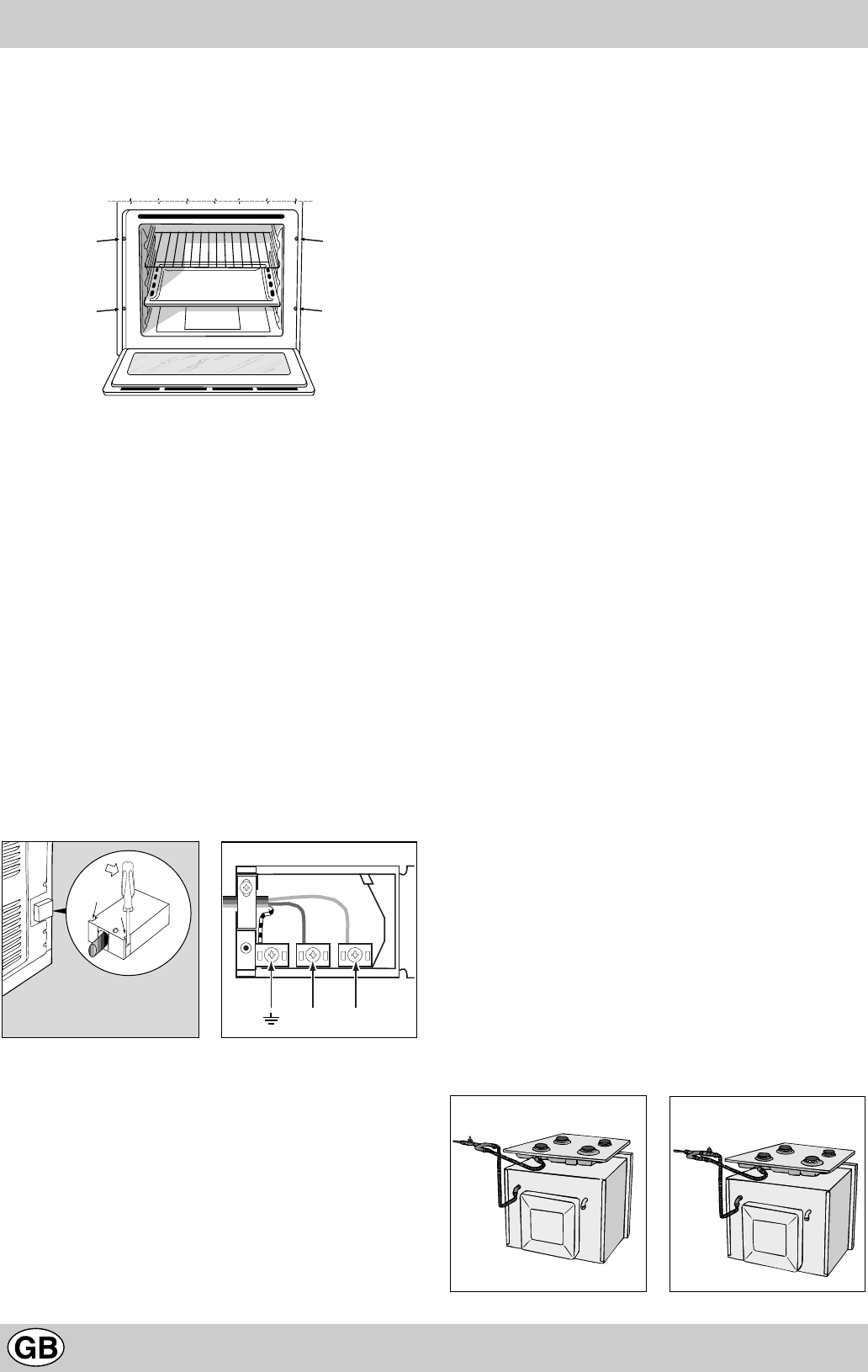
20
All parts which ensure the safe operation of the appliance
must be removable only with the aid of a tool.
To fasten the oven to the cabinet, open the door of the
oven and attach it by inserting the 4 wooden screws into
the 4 holes located on the perimeter of the frame.
Electrical Connection
Those ovens equipped with a three-pole power supply
cable are designed to operate with an alternating current
with the voltage and frequency indicated on the data plate
(located on the appliance) and in the instruction manual.
The wire for earthing the appliance is yellow-green in col-
our.
Fitting on a Power Supply Cable
Opening the terminal board:
• Using a screwdriver, prise on the side tabs of the ter-
minal board cover;
• Pull open the cover of the terminal board.
To install the cable, proceed as follows:
• Remove the wire clamp screw and the three contact
screws L-N-6
• Fasten the wires beneath the screwheads using the
following colour scheme: Blue (N) Brown (L) Yellow-
Green 6
• Fasten the supply cable in place with the clamp and
close the cover of the terminal board.
Connecting the supply cable to the mains
Install a standardised plug corresponding to the load indi-
cated on the data plate. When connecting the cable di-
rectly to the mains, install an omnipolar circuit-breaker with
a minimum contact opening of 3 mm between the appli-
ance and the mains. The omnipolar circuit breaker should
be sized according to the load and should comply with
current regulations (the earth wire should not be inter-
rupted by the circuit breaker).
The supply cable should be positioned so that it does not
reach a temperature of more than 50°C with respect to
the room temperature, anywhere along its length.
Before making the connection, check that:
• The electrical safety of this appliance can only be guar-
anteed if the cooker is correctly and efficiently earthed,
in compliance with regulations on electrical safety. Al-
ways ensure that the earthing is efficient; if you have
any doubts call in a qualified technician to check the
system. The manufacturer declines all responsibility
for damage resulting from a system which has not been
earthed.
• Before plugging the appliance into the mains, check
that the specifications indicated on the date plate (on
the appliance and/or packaging) correspond to those
of the electrical mains system of your home.
• Check that the electrical capacity of the system and
sockets will support the maximum power of the appli-
ance, as indicated on the data plate. If you have any
doubts, call in a qualified technician.
• If the socket and appliance plug are not compatible,
have the socket replaced with a suitable model by a
qualified technician. The latter, in particular, will also
have to ensure that the cross section of the socket
cables are suitable for the power absorbed by the ap-
pliance. The use of adapters, multiple sockets and/or
extensions, is not recommended. If their use cannot
be avoided, remember to use only single or multiple
adapters and extensions which comply with current
safety regulations. In these cases, never exceed the
maximum current capacity indicated on the single
adapter or extension and the maximum power indicated
on the multiple adapter. The plug and socket must
be easily accessible.
Gas connecting
The appliance should be connected to the gas mains or
to a gas cylinder in compliance with current National
Norms. Before making the connection, check that the
cooker is regulated for the gas supply you are using. If
not, follow the instructions indicated in the paragraph
“Adapting to different types of gas.”
When using liquid gas from a cylinder, install a pressure
regulator which complies with current National Norms.
Important: Check that the supply pressure complies with
the values indicated in table 1 “Burner and Nozzle Charac-
teristics” since this will ensure safe operation, correct con-
sumption and ensure a longer life to your appliance.
Should you need to install a gas hob on top of a built-
in gas oven, it is strictly forbidden to make the connec-
tion between the two or to use a single cut-off tap.
The two appliances should be connected separately,
and each one should have its own stop tap to render
them independent from one another.
NL
NO
OK


















